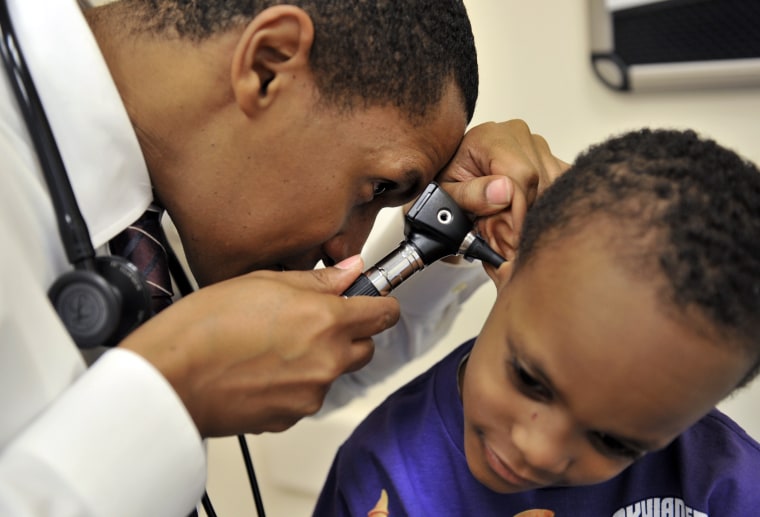Congress should improve Obamacare without taking away what’s best about it, doctors said Thursday.
Doctors who treat women and children, as well as general practitioners, made a daylong dive across Senate offices to make the case for keeping important aspects of the Affordable Care Act. And they rebuked Republicans in Congress for talking up repeal without having a plan for replacement in place.

“Currently insured individuals should not lose their coverage as a result of any action or inaction by policymakers,” five medical organizations said in a statement released as part of the lobbying push.
“Acceptable reform must continue to ensure access to comprehensive, safe, and affordable care,” said Dr. Thomas Gellhaus, president of the American Congress of Obstetricians and Gynecologists.
Related: Last Day to Sign Up for Obamacare and the Future is Uncertain
The GOP has vowed to repeal and replace the 2010 Affordable Care Act, former president Barack Obama’s signature policy. But since they took firmer control of the Senate, kept control of the House and seated Republican President Donald Trump in the White House, they’ve faltered, quarreling about how to move ahead.
"Potential changes in federal Medicaid funding should not erode benefits, eligibility, or coverage compared to current law."
It doesn’t help that the law’s become more popular in the polls. Republicans do not want to pull the rug out from under the 20 million people who have gotten health insurance under the law, either on the exchanges where they can buy private insurance, often with a federal subsidy, or through expansions of the Medicaid program.
"We didn't hear from anyone who said we want to have the 20 million people who have gained coverage under the Affordable Care Act....be kicked to the curb and have no insurance overnight," said Dr. Karen Remley, CEO and executive vice president of the American Academy of Pediatrics (AAP), who visited half a dozen senators Thursday.
The AAP, American Academy of Family Physicians, ACOG, American College of Physicians, and the American Osteopathic Association have a road map for lawmakers.
“We urge Congress and the new administration to preserve essential coverage, benefits and consumer protections as established by current law, including the Affordable Care Act (ACA); we also acknowledge the need for additional reforms and improvements to address continued barriers to care and ensure a health care system optimized for patients and their physicians,” they said.
Related: Uncertainty May Scare Insurers Off Obamacare Exchanges
Here’s what they are asking to keep:
Continued coverage
“First and foremost, this means continuing to ensure all Americans have access to health insurance. Prior to the ACA, 47 million Americans were uninsured,” Gellhaus said. “Potential changes in federal Medicaid funding should not erode benefits, eligibility, or coverage compared to current law,” the statement added.
CHIP
The Children’s Health Insurance Program and Medicaid cover 32 million children. “As pediatricians, we know that health coverage provides children across the country with access to services they need to thrive, including life-saving vaccinations and well-child check-ups,” said Dr. Fernando Stein, president of the AAP.
Subsidies
“The value of current subsidies should not be eroded,” the doctors’ groups said. About 85 percent of policies sold on the ACA exchanges get a federal subsidy to help people pay premiums. The cost to the federal government was about $660 billion last year, according to Congressional Budget Office forecasts.
Pre-existing conditions
They should still be covered, even if people do not keep health insurance coverage continuously. Republicans want to replace the widely disliked mandate to carry health insurance with more of an incentive for people to take responsibility by keeping themselves covered. The physicians say in the long run it saves everyone money if insurers just cover everything early, before illnesses get even more serious.
"As parents we would do everything for our children. As a country we should, also," said Remley, a former pediatric emergency room physician in Norfolk, Virginia.
Related: Trump's First Act is an Obamacare Order
Essential benefits
The ACA and regulations supporting it call for insurance companies to cover a minimum of health care, including vaccines, cancer screenings and women’s health. The last is perhaps the most controversial, with the Trump administration signaling it may ease up on employers and insurers who don’t want to provide birth control and pregnancy coverage. “Acceptable reform must continue to ensure women are not denied coverage due to pre-existing conditions or charged more because they’re women. Together, we urge Congress to retain these and other valuable patient protections, and not turn the clock back on women’s health,” Gellhaus said.
No caps
Before the ACA, insurance companies could stop paying for coverage once someone got too expensive. The doctors’ groups are adamant that they should not be allowed to return to those practices.
Here’s what they want to change:
Drug costs
They’d love to see Congress work to lower prescription drug prices. "You don’t want to be the doctor that orders this new and important drug for a child and know that it’s going to bankrupt the family," Remley said. "Prices have skyrocketed for no reason."
High deductibles
Some of the plans on and off the Obamacare exchanges have low premiums and high deductibles, meaning patients have no idea what kind of bills they’ll be hit with until they get sick.
More competition
If more health insurance companies join the ACA exchanges, prices should come down and patients should have more choice, the groups say. Most experts agree on this, but health insurance companies say they’ve been forced to cover too many sick people without enough well customers paying premiums, and many have dropped out of the exchanges in some states.
More choice
To keep premiums down, many insurers offer narrow networks of covered physicians, other caregivers, hospitals and clinics. The doctors’ groups think changes can widen that choice.
Incentives
The groups appear to agree that the mandate is too unpopular but urge Congress to come up with better ways to lure younger, healthier people onto the insurance exchanges.
Less red tape
Doctors are almost universal in their loathing of the paperwork and bureaucracy that go with providing medical care and they’d be delighted if Congress could do something about it.
Continued research
Research into what works to keep patients healthier and lower costs must continue. Medical groups insist of evidence-based changes, not on legislation based on untested beliefs or philosophies.
“Every new Congress has the opportunity to improve existing legislation. We are hopeful that lawmakers will continue or improve their constituents’ access to health care as they evolve the system in place today,” said Dr. William Burke of the American Osteopathic Association.
“Keeping the emphasis on primary and preventative care is the best prescription for the nation.”

